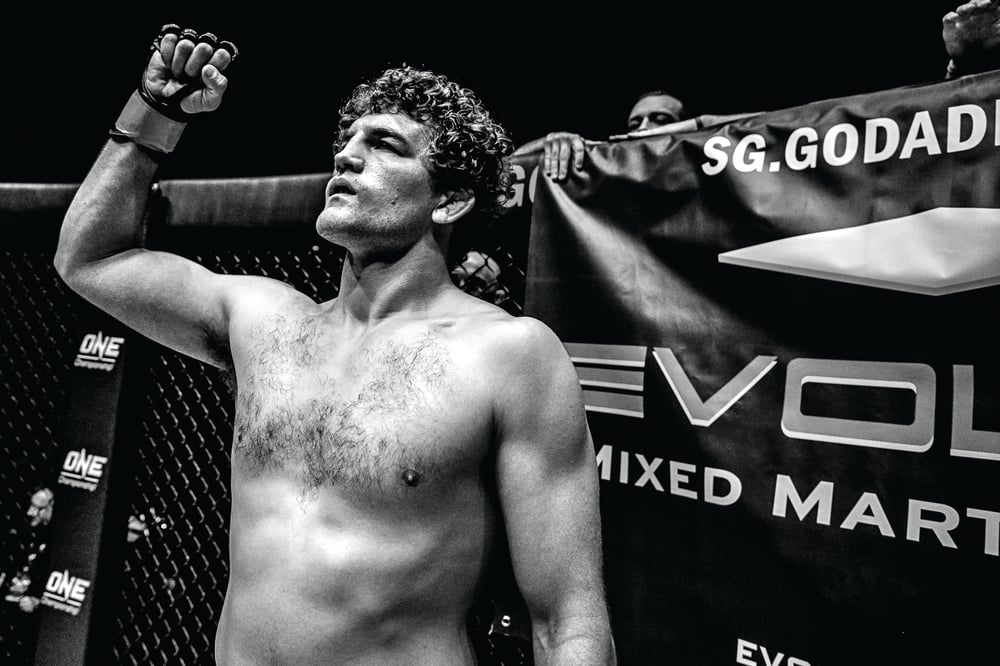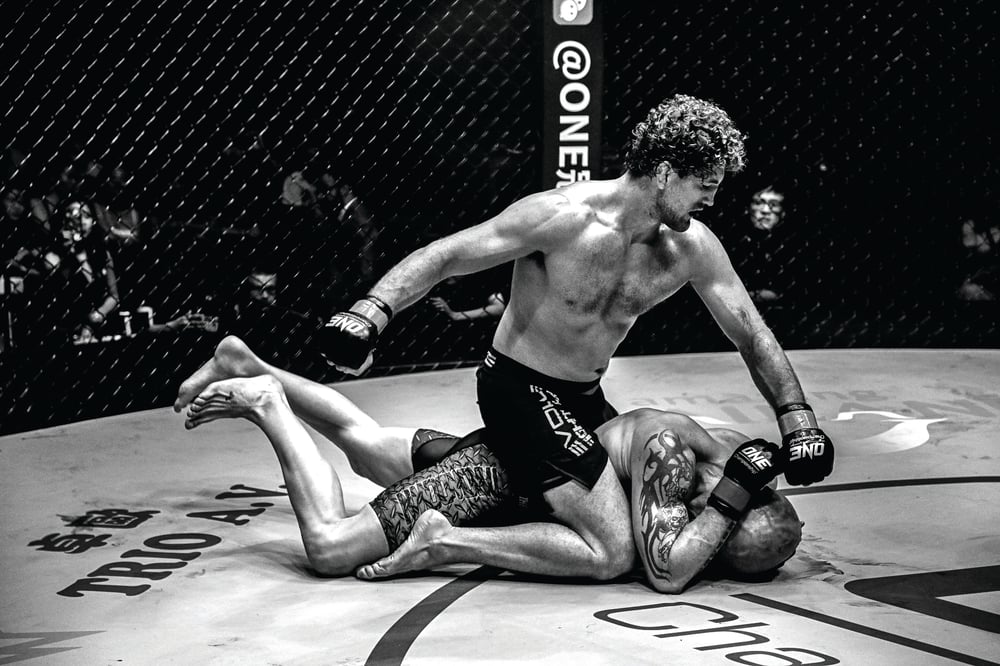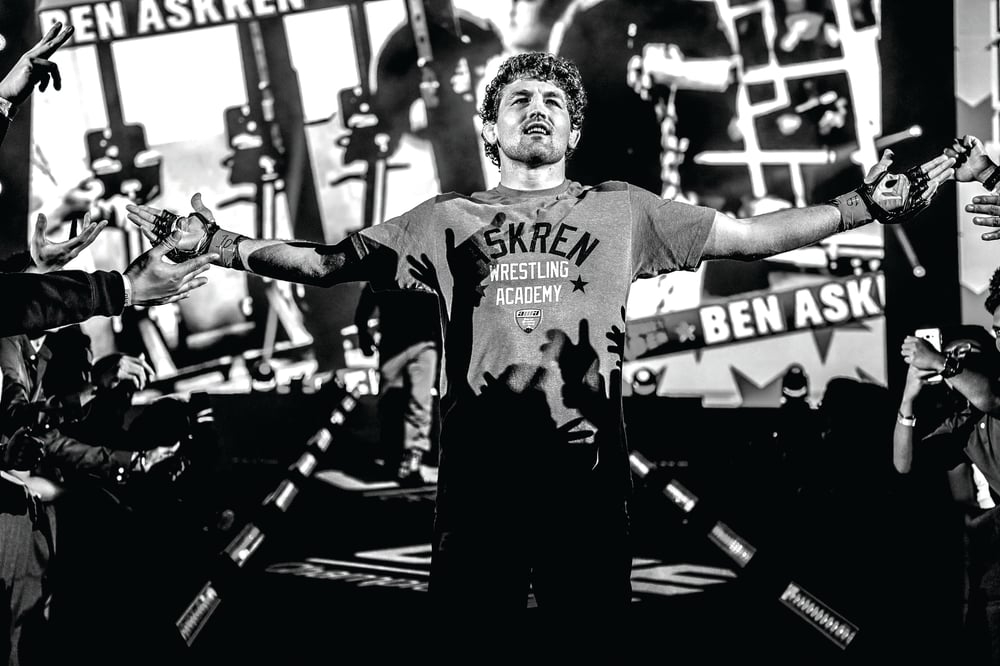
Issue 164
February 2018
Ben Askren ended his MMA career on his own terms with a perfect record. Is there any better way to go out?
More often than not…it’s retirement, as opposed to another human being, who represents a professional fighter’s greatest opponent. Taken for granted, retirement will initially be seen by most not as an obstacle, but as some kind of promised land and will, in time, exploit this ignorance. It’s then a fighter realizes it possesses durability like no other, can come on either suddenly or over a long period of time, and brings with it fear, anxiety and uncertainty. It’s omnipotent, it chips away, and it usually gets its way, leading to an ill-advised comeback and, finally, a further retirement (of the tougher, sadder, and sometimes enforced, variety).

Every fighter believes they can control retirement, conquer it, stay retired, but few possess the ability to do so. The latest to try, and arguably one of the fighters best equipped, is Ben Askren – a former Bellator and ONE Championship welterweight titleholder accustomed to controlling opponents – who decided to call it a day in November following a one-round demolition of Shinya Aoki in Singapore. He, more than anyone, knows what it’s like to be in control and on top – in fights, in business – and will presumably need all of what made him a success if he’s to buck the trend and stay retired.
“I feel awesome. I’m really enjoying it,” says the 33-year-old, speaking from his home in Wisconsin. “I’m spending a little more time around the house, not having to go and do my workouts, and eating a little more than I normally would. I’m still working full-time at the wrestling academy (Askren Wrestling Academy) and I really enjoy that. All in all, it has been a good couple of weeks.”
The first fortnight is deemed the honeymoon period for any retired fighter. It’s one long afternoon snooze on the sofa as the television plays your favorite movie. It’s indulgent, certainly, but it’s the kind of indulgence that feels deserved. Eat what you want, do what you want, there are no calls for you to be at the gym for a certain time, and no apprehension ahead of an upcoming fight. Retirement is, instead, a prolonged sigh of relief.
“The everyday grind of waking up and thinking about training,” is Askren’s response when asked what he’s happy to have left behind. “I started training year-round in 1999 with wrestling and, in those 18 years, the longest period I’ve taken off is eight days. In my early MMA career, if I fought on a Saturday, I’d be back in the gym Monday. In later years, I’d still be working out the next week, just not as hard; instead of doing nine workouts, I might do four or five.
“The only workout I’ve done since the Aoki fight, 12 days ago, is some hot yoga and some private lessons with the kids I coach.”

Ben Askren, master strategist, is MMA’s great competitor. More than that, he is a winner: capturing welterweight titles in Bellator and ONE Championship and making good money in the process.
Above all else, Askren, unbeaten in 19 fights, will be remembered as smart. Smart enough to go where he was valued; smart enough to not get hit with a single punch in 2017, a year that saw him win three fights; smart, the critics say, to avoid joining the UFC and facing the best welterweights in the world, those capable of scrubbing the zero from his record.
“It wasn’t my choice,” he says, dismissively. “I said yes to every fight I could say yes to, I weighed in on weight every time, and I won every fight I could have won. There was nothing else I could have done. I was never offered the chance to go and compete with those people, so I did what I had to do.”
Dana White, UFC President and the man ultimately responsible for who comes and goes, has spoken plenty about Askren in the past. He accused the dominant wrestler of stuffing his record with sub-par opposition and claimed his style – all relentless takedowns and suffocating top pressure – is pay-per-view poison. He has even gone so far as to suggest Askren never really wanted to fight in the UFC, the so-called home of true competition. Exhausted by it all, Askren says only this: “He’s a very insecure man. You would think someone with half a billion dollars wouldn’t be insecure, but that man is very insecure.”

If Askren in the UFC failed to materialize during the American’s pomp, when his stock was high and title defenses were frequent, it’s unlikely it will come to pass in the coming years. Instead, Askren’s name will vanish from rankings, his supporters will move on, and White’s attention, as well as that of the UFC welterweight roster, will be focused elsewhere. But that doesn’t mean Ben Askren is in a rush to forget about MMA.
“I’d love that,” he says of a dream fight with former UFC welterweight king Georges St-Pierre. “He’s the best welterweight of all time. It’s as simple as that.
“I always called him out when I was in my younger years, but when he retired I respected that and didn’t say his name at all. Now he’s back, I would love for that fight to happen.
“GSP doesn’t really love a hard fight,” Askren continues. “When he gets in a tough fight, what he relies on is taking people down over and over again. Even in the (Michael) Bisping fight he started doing it. I think I will be a tough fight for him because I just won’t go away. I’m very persistent, I’m very durable, I’m very tough. He won’t be able to pin me down. I actually think it would be the reverse of that. I would be taking him down. That’s why I think it would be a good matchup for me.”
Speaking of styles, the irony of Georges St-Pierre being carried back to his UFC throne, following four years away, is not lost on Askren, a man shunned by the world’s largest MMA organization. Their contrasting career paths serve only to confuse.
“Georges St-Pierre, who is the second biggest pay-per-view star of all-time in the UFC, fights with the same style as me,” says Askren. “He once had seven decisions in a row; all he did was take people down and punch them. They can say the fans don’t like my style but the numbers don’t show it. Georges is one of the most popular guys of all time. His style is absolutely what I do.”

As quickly as Askren teases a comeback, and in doing so reveals perhaps his only weakness, he pulls away and shakes his head at the idea. It’s St-Pierre or no one, he reiterates. Nobody else is worth his time. Not Robbie Lawler, not Stephen Thompson, and certainly not Tyron Woodley, his friend and training partner, who, he says, would give him more trouble than any other 170lb fighter alive. “He’s got really good wrestling and hits really hard,” Askren explains, before adding, “Obviously I don’t want to fight Tyron because we’re really close friends, but if somehow Tyron was to lose – which I really don’t see happening – and there was another UFC welterweight champion, I’d take that fight…”
There’s that opening again, the door left slightly ajar. It’s a sign of a fire still burning, an indication Askren, the man always in control, always one step ahead, is human like the rest of them.
“Georges (St-Pierre) took four years off,” he reminds us. “But I’m happy, I’m retired, and I’m in no rush at this point. I’ll be staying in shape, training with my kids at the wrestling academy. Not tip-top, world-class shape, but I’ll be staying in shape. I don’t have any bad habits. I don’t drink, smoke or do drugs. I never did PEDs (performance-enhancing drugs). I’m hoping my body will age pretty well. Maybe now the training stresses are off my body, some of the small, nagging injuries will heal up. Who knows. In a couple of years, we’ll see.
“Remember, I didn’t start doing MMA until I was 24,” he adds. “I’ve only been doing it eight years, so am in this unique position where it feels like I’m still improving. When I retired from wrestling, I’d been doing it 19 years.
“I feel like my skills are getting better but, physically, I can’t train the way I used to train. Not even close. I used to be a freaking animal. I would just go and go and go. I wouldn’t get tired, I wouldn’t get sore. I would just keep bringing it, day after day. There were some years in wrestling where I took three or four days off the entire year. But now I’ve got to a point where if I have two hard training days I will feel like s**t the third day. I can’t train anywhere near the intensity I did five or 10 years ago.”

Truth is, Ben Askren’s retirement is one he predicted and planned long ago. On the cards since 2015, Askren lined up his grand finale knowing if he didn’t, there would always be a next fight, a next event, a next opponent. He knew that if he didn’t specify an end, the end would, in all likelihood, never come.
“I knew for two years,” he says. “When I re-signed with ONE Championship at the end of 2015 I knew the last fight on that deal would be the last of my career. You have to set a deadline at some point, right? That’s the issue with a lot of these guys who stick around too long. You never feel that much worse, one fight later, but it’s the accumulation.
“I’ve read every athlete autobiography and there is almost nobody who retired at the right time – nobody. Not just in fight sports, either. Any sport. No one wants to give it up. But I made a determination early in my life that I would not stick around. I didn’t want to be the guy everyone feels bad for because he sucks and he used to be great.”
In retiring now, at 33, Askren has swerved the aging process all fighters seem to endure. Cop-out to some, stroke of genius to others, one thing Askren’s premature evacuation has ensured is an end to the wear and tear of training and the potential for damage on fight night. His last fight, the fight in which he was supposedly meant to leave it all in there, couldn’t have been easier if he’d been armed.
“I couldn’t be happier with the way that fight went,” he says of the 57 seconds he spent mauling Aoki. “I want it over as quickly as possible. That’s always the goal. Taking prolonged damage is a very negative thing. Anyone who says they want to be in a slugfest is stupid and should stop. I can’t understand these fighters who feel like they have to prove how tough they are. You fight people in a cage for a living. If you really feel the need to prove your toughness, you have some issues.
“No one was talking about CTE when I started fighting, but we’ve always seen guys who were in slugfests earlier in their career and then later they get touched and fall over. Wanderlei Silva is a great example, and so is Shogun Rua and Chuck Liddell.”
It’s at this point you swing back the other way and start to think maybe Ben Askren will stay retired. He knows the dangers of sticking around too long. He understands what it means to be damaged. He has, in his mind, nothing left to prove, nowhere else to go. What’s more, the competition angle, the thing retirement will frequently use to prod its victims, seems by the by for Askren. He can get it elsewhere, he says; through his kids, helping them become successful in whatever it is they choose to do, and in business. It doesn’t necessarily have to entail two human beings punching and kicking each other.
“Not impossible, but I would say it’s unlikely,” he says when asked if retirement might, at some point, turn into a comeback. “If I had the choice, though, I would go fight Georges St-Pierre in six months. I’d fight one more time.” If he doesn’t transpire that way, Askren appears absolutely content. For now, at least.
“I think I was just so consistent,” he says. “My message was consistent, I made weight every time, I won every time, I showed up every time, I didn’t do any drugs, I didn’t get arrested. You don’t see all that in MMA much.”
Even rarer, of course, is the fighter who retires and stays retired. But you don’t have to tell Ben Askren that.
...









